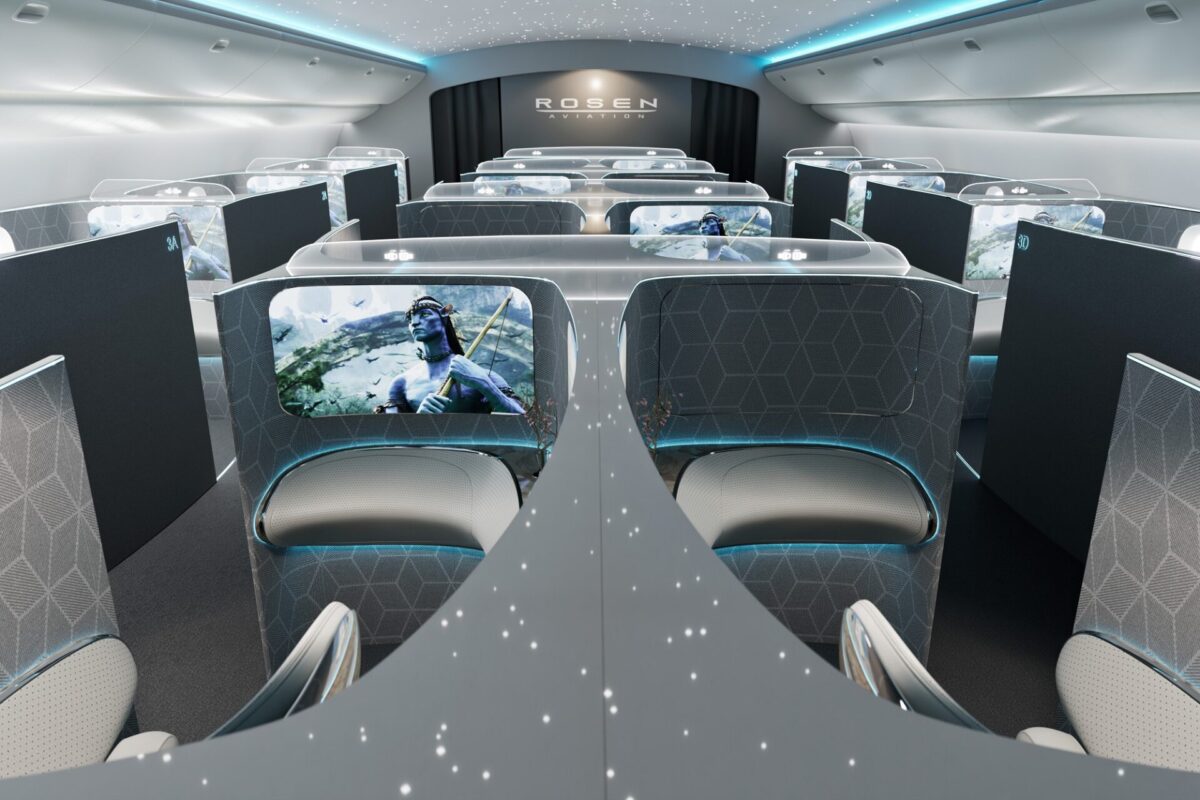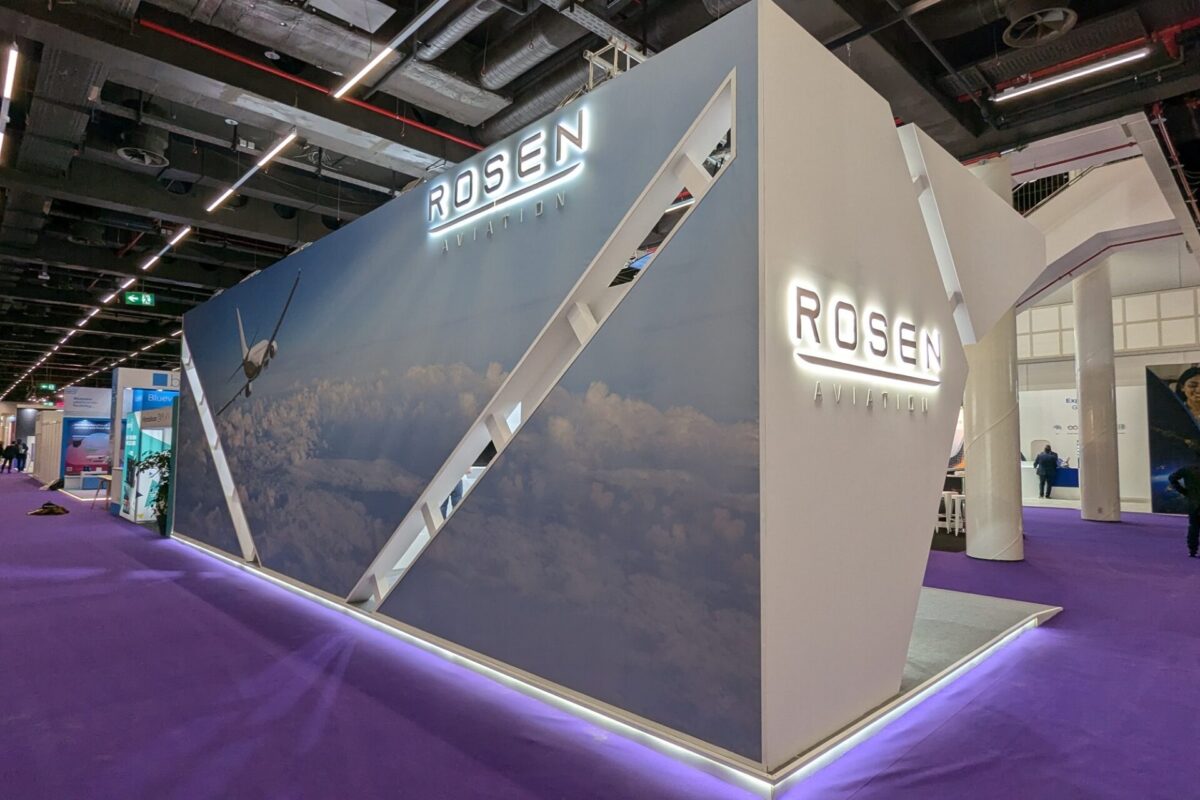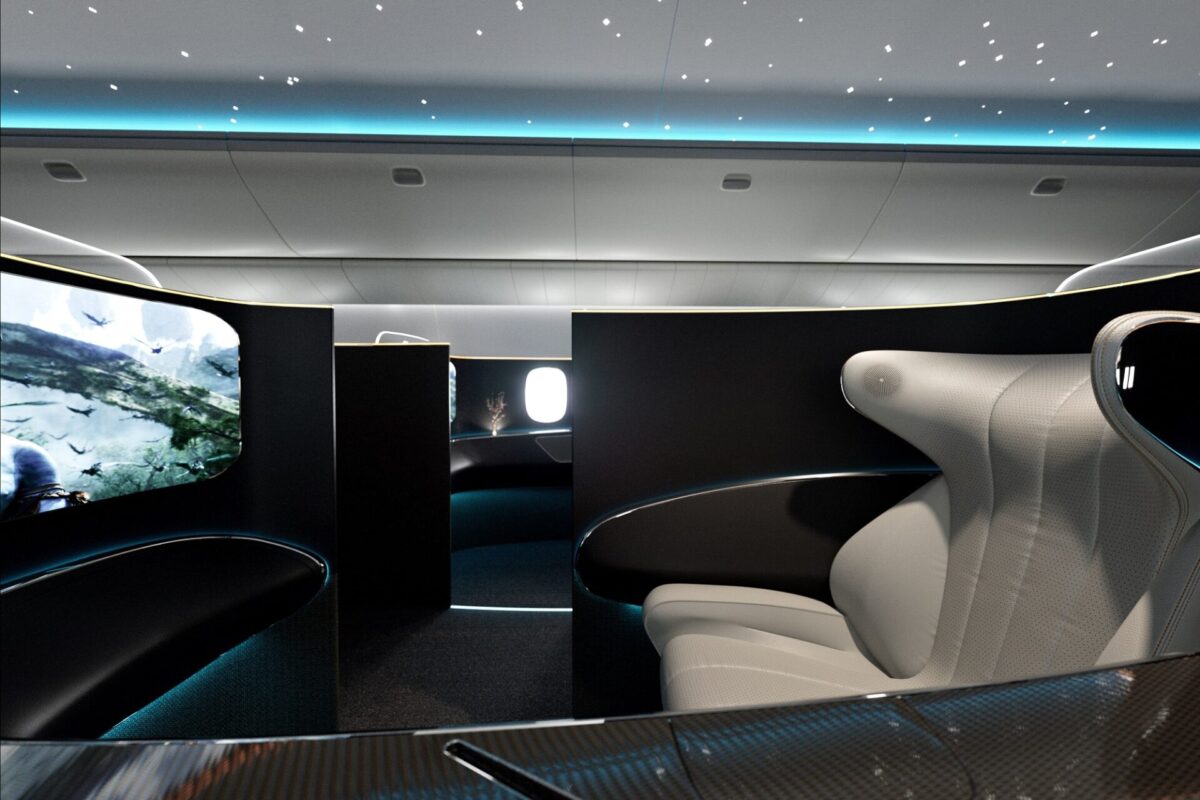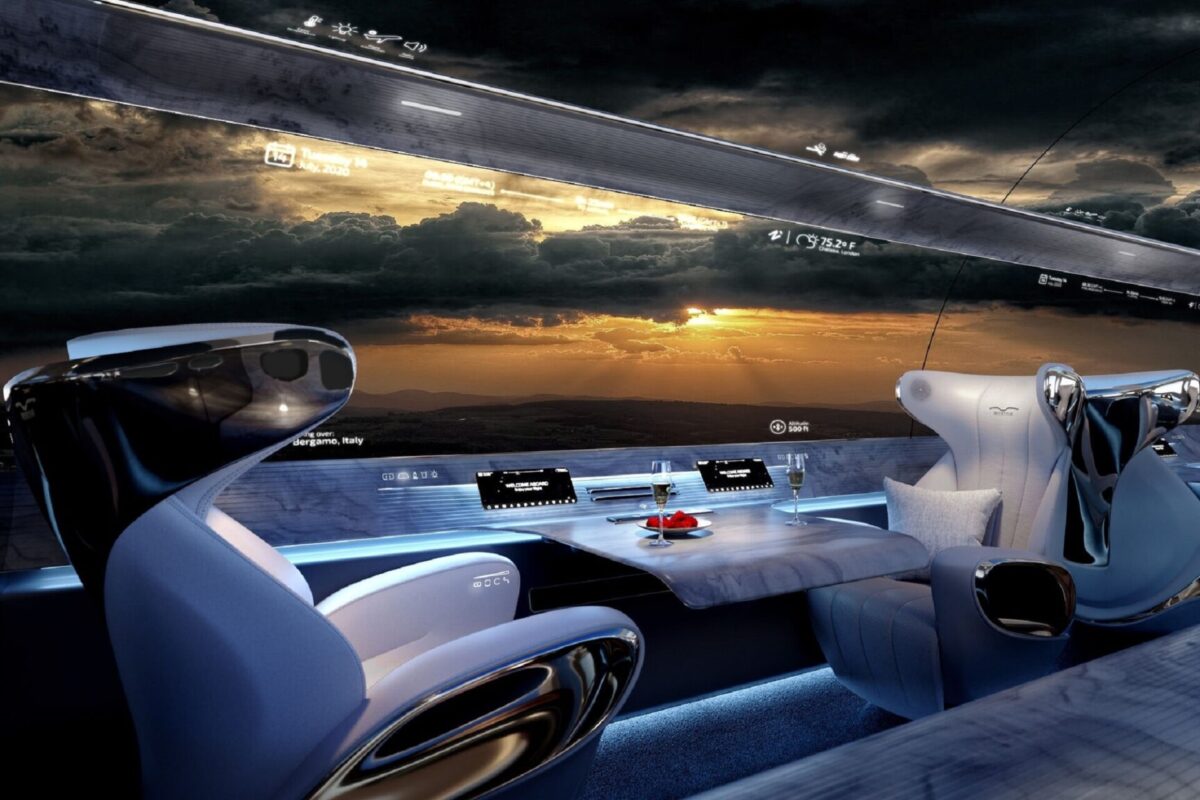After 45 years of innovation, In-Flight Entertainment (IFE) and cabin electronics trailblazer Rosen Aviation has maintained an insatiable appetite for disrupting and provoking the aircraft interior market.
The need to disrupt comes from a fundamental belief that it is only when you push, shake and probe that you discover the solutions that will make a real difference to your customers.
“The reality is from the passenger’s experience, copy and paste does not deliver the best experience. It delivers yesterday’s experience,” said Lee Clark, Senior Vice-President Strategy at Rosen Aviation. “Rosen sees part of its role in the industry, to provoke, to push, to drive, to engage and to create meaningful change, meaningful positive change.”
And since 1980, Rosen Aviation has been doing just that, rising to become a global leader in providing aviation displays, IFE technologies and cabin electronics to the VIP aircraft, business aviation and commercial flight markets.
While hard work has certainly played its part in Rosen Aviation’s success it’s the company’s passion for innovation and a redefinition of the relationship between a customer and provider that really sets it apart from industry rivals.
AeroTime spoke with Lee Clark to understand what drives Rosen Aviation, the ethos behind the passion and the pivotal role the company has played in reshaping the capabilities of the aircraft cabin.
‘Innovating on the experience’
Based in Eugene, Oregon, Rosen Aviation has grown to work with some of the powerhouses in the aviation industry such as Gulfstream, Boeing and Greenpoint Technologies.
The company’s founder, John Rosen, was himself a colossal innovator who invented the first translating aviation sun visor and introduced the world to in-seat LCD screens.
His creative mind set Rosen Aviation on a trajectory to transform the aviation world and laid the foundations for the company’s emergency as a frontrunner in the industry.
“I think John’s perspective on innovation and the application of technology has stayed with Rosen, right the way through innovation is one of our core tenets. It’s why we’re thought leaders. We actively search out what’s possible,” explained Clark.
Today, Rosen Aviation focuses on “providing solutions for an enhanced passenger experience in tomorrow’s aircraft cabin” while working within the business aviation, commercial aviation, Tier 1 providers and VIP markets.
The company includes a workforce of more than 65 team members working at a 45,000 sq. ft site where engineering, design, testing, manufacturing and production all happen under one roof.
Technologies designed, developed and installed by Rosen Aviation include high-quality video displays, touch screens, audio solutions, cabin management systems, IFE systems and other related avionics equipment that improve the functionality and comfort of aircraft.
“Our roots are in displays and IFE, but the reality is, we’re incredibly good at aviating technology, whether it’s consumer or other technology, we’re incredibly good at working out how to get it on a plane and going through the certification process to achieve that,” said Clark.
He added: “When a customer comes up and says, ‘I’ve got a dining room and I want to put projectors in the ceiling and have 360° floor-to-ceiling wall projection’, they come to us because they know we can make it happen.”
The here and now
Recently Rosen Aviation announced what it described as the “most impactful announcement in our organization’s long, storied history”.
After setting a goal to provide a “highly capable, innovative one-stop-shop for all cabin electronics needs”, on April 2, 2025, Rosen launched Celestia – the world’s first operator designed Cabin Management System (CMS) for VIP, business and commercial aviation cabins.
Since 2007, Celestia CMS had been used by an industry-leading VIP aircraft operator. Now, the two companies have collaborated to further develop the system and introduce to new customers.
The CMS aboard an aircraft allows passengers and crew to control and adjust various aircraft functions, including lights, cabin temperature and audio-visual entertainment options.
“Priority number one was reliability. It doesn’t matter how fancy and wild the technology is. It’s for nothing if it doesn’t actually work. So, reliability, and it is outstanding reliability. In almost 20 years of failures, you’re in the single digits over that period,” said Clark.
Developing the CMS with an operator meant Rosen Aviation could understand exactly what the passenger end user’s needs truly are and as Clark explains it’s a “very different lens to be looking through during the development process”.
While Rosen Aviation is launching Celestia in the VIP aircraft market, this will be followed by the business jet sector and eventually commercial planes.
“It’s unique. There’s nothing like it. It can be as simple or as redundant and complicated as you want. It works with just about everything on the market. And it’s simple to configure, simple to install, and easy to run and operate,” explained Clark.
The Rosen Aviation approach
“Right from the first contact with a new customer, we encourage them to think outside the traditional paradigm” – Clark
Rosen Aviation’s approach to its custom aircraft cabins is not solely about innovative technology but innovative experience and it’s this ethos that allows the company to push further than its competitors.
“Can we transform the experience? It’s not just about a better mouse trap, it’s whether we even need one at all. It is a completely different thing,” quips Clark.
According to Rosen Aviation, customers are now asking for the same experience on an aircraft as they have at home and now even receive in their cars.
“They’re getting substandard experiences [on aircraft] because people are afraid of the risk,” explained Clark. “Do your due diligence and find a company that has a track record of delivering on their promises. Partner with a company that has a track record of delivering the latest technologies in a respectable time frame.”
Clark added: “It’s no good putting technology onto a plane five years after it comes out, the world has moved on at that point, especially in the VIP world, where people do want the latest and greatest. So, from a procurement perspective, go find good partners, lean into them, work collaboratively.”
Part of the success of Rosen Aviation delivering as promised to its customers is the emphasis placed on engineers understanding the customer’s brand and using their expertise to guide the process.
“One of the first questions you’ll hear from our engineering team now is “okay, I’ve read the SOW (Statement of Work) I’ve seen the specification. Now, help me understand what’s the intent, what’s the purpose, what’s the experience you’re trying to create?’” said Clark.
“And they’ll push back, and say, ‘well, if that’s the experience, this is not the right way to do it. Here’s what you need’, and then it’s a truly joint development process. And I think that really differentiates us to many of the competitor’s organizations out there who are still engineering driven.”
Excelling where others can’t
Rosen Aviation highlights its agility as a contributing factor to the company’s success and its ability to take on projects that larger technology companies can’t.
“We’re small, we’re lithe, we’re agile, we’re responsive. We deliver on time, and we deliver what we promised,” said Clark.
One project that Rosen Aviation is particularly proud of is the unveiling of the world’s largest aviation IFE display – a 97-inch OLED screen – which was approved and certified by the European Union Aviation Safety Agency (EASA).
“Here is a piece of Rosen that is fearless, but I’d counter that by saying it is absolutely categorically not reckless. We’re incredibly risk averse, like everybody, but we’re sufficiently experienced to be able to leverage that experience to realize what we can do, what we can’t do. And when we say, ‘Yes’, we can, we have a level of confidence based on our 45 years of experience that allows us to push the boundaries,” said Clark.
The 97-inch OLED screen epitomizes Rosen Aviation’s ability to offer “boutique solutions” to its clients that push the boundaries and innovate.
“If a VIP customer came to us and said, ‘I’ve got a really big plane and I want a 200-inch display, can you make me one?’ The answer is, yes. ‘Can you make me one in less than 12 months?’ Quite probably,” said Clark.
Clark describes Rosen Aviation as the high-end of interior aircraft solutions for customers that want that extra, premium product.
“Think of going to Savile Row for a suit. It’s the very best materials. It’s literally the best suit you can possibly buy. It’s definitely not the cheapest suit, but it is the best suit, and it is exactly tailored to you,” added Clark.
LeftField Labs and AI frontier
Perhaps unsurprisingly Rosen Aviation has been utilizing Artificial Intelligence (AI) for many years as part of its design processes and is acutely aware of the technology’s capabilities.
However, Rosen Aviation is also aware that its success is down to the human intelligence of its engineers.
“We use AI intelligently. Basically, use AI for its best advantages. Make ourselves more efficient, to come up with a better solution. It’s one tool amongst many, but we put a great emphasis on the human element at Rosen and I think that that will always continue to be the case,” said Clark.
Rosen Aviation’s future products are crafted and designed in its LeftField Labs – think James Bond kit for the aviation industry.
“Left field labs came out of sort of customer demand, but also an internal demand for the James Bond experience of going out in the marketplace. Seeing what customer consumer trends and technologies are taking place and how we can adapt those, if they can be adapted, or what some of the barriers are,” explained Clark.
Among the incredible concept products are digital windows and skylights that use 4K OLED displays and holographic controllers for touchpads, keypads, sliders and more.
“Innovation is, is a critical element of what we do here,” said Clark.
Rosen Aviation was present at this year’s Aircraft Interiors Expo, which was held between April 8 and 10, 2025, in Hamburg, Germany.
To learn more about Rosen Aviation visit the company’s website.








